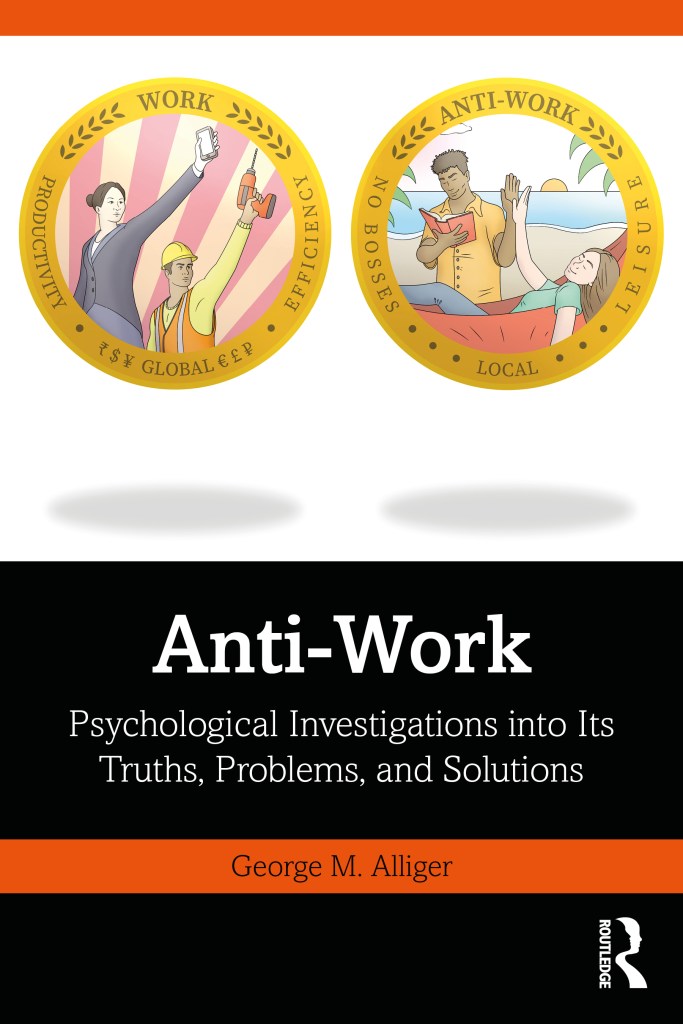New Book on Anti-Work
Copyright 2022

Some people don’t like their jobs. Others have a problem with work in and of itself: this is anti-work.
Below you can peruse the Table of Contents.
Here is a link to the Amazon page for the book, or to author page.
Here is the link to the publisher’s page for the book.
Recent Related Articles
Alliger (2024). How to better communicate the likely effectiveness of proposed training: Interpreting meta-analytic results for (and with) an applied audience. International Journal of Training Research.
Alliger & Zaretsky (2023). The crucial difference between work and labor. Boston Globe.
Alliger (2022). Kafka warned us: surveillance turns the watched into watchers. Psyche.
Alliger (2022). Merit and the god of Death. From the book.
Zaretsky & Alliger (2022). Two Philosophers Found Purpose in the World of Work. Wall Street Journal.
Alliger (2021). On Not Identifying (Too Much) With Management. TIP Magazine.
Alliger (2021). Gen Z Cannot Live with Work, Nor Without It. Los Angeles Review of Books.
Alliger (2021). Social Capital versus Roots. Attention.
Alliger (2019). Deriving Meaning from Work is Neither New nor Bad. Industrial and Organizational Psychology.
Reason for this book: The recent pandemic has altered how we view work, as can be seen in dramatic trends such as the “Great Resignation.” Of course, employment has never been perfect, and work psychologists like myself have long tried to identify and lessen the difficulties faced by workers of all kinds. However, thinkers from a wide variety of backgrounds have anticipated the current changing attitudes toward employment, arguing that work itself has fatal, perhaps unaddressable flaws.
My belief is that carefully identifying and examining the premises and arguments behind this supremely negative evaluation of work – which can be called anti-work – is a useful undertaking. Only by honestly weighing the positions of anti-work thinkers can we determine where and to what extent they are valid. In addition, such understanding can guide our advice to those who struggle at work or outside of it.
Intended audiences:
- General readership as well as academic; this book does not presuppose any knowledge of psychology. As a glance at the Table of Contents will show, I have drawn on insights from a wide variety of traditions and disciplines. This eclectic array of voices highlights the general nature of the book.
- Psychologists and students of psychology will also find it intriguing as they read it in the light of their own particular areas of interest.
- Supervisors and mid-level managers should find that the views of anti-work thinkers a) challenge some of their own preconceptions about workers and work and b) can help guide their behaviors and attitudes toward employees.
- All those who are employed, as well as those who don’t work will find assistance in thinking about their own life situations.
Email: George Alliger
Table of Contents
INTRODUCTION: WHAT IS ANTI-WORK?
PART I IN WHICH ANTI-WORK IS GIVEN SERIOUS CONSIDERATION
CHAPTER 1 THE TENETS OF ANTI-WORK
Each tenet is discussed
CHAPTER 2 WILL, BOSSES, AND CONSCIOUSNESS
The central anti-work concept of worker submission is critically examined from several angles
CHAPTER 3 CULTS AND WORKING FROM HOME
The Corporate Stockholm Syndrome, cults and work, and the submission of working from home
CHAPTER 4 THE ASYMMETRY OF AT WILL EMPLOYMENT AND LOSS OF AUTONOMY
How we have structured employment to be fundamentally asymmetrical
CHAPTER 5 THE UNIQUE SUBMISSION REQUIRED FOR PRECARIOUS WORK
All work may require submission, but there are degrees
CHAPTER 6 MERIT MISFIRES
The assessment of merit should facilitate a fair assignment of work and rewards – but does it?
CHAPTER 7 PUSHING BACK
The psychology of worker resistance
CHAPTER 8 DOUBTFUL HORIZONS
Utopian thinking in anti-work
PART II IN WHICH WE REFLECT ON SOME POSSIBLE REALITIES AND RESPONSES
CHAPTER 9 SCIENCE AND THE OX: UNDERSTANDING WORK AND WORKERS
We began looking at work “objectively” but the workers required a say
CHAPTER 10 REPRESENTING THE WORKER: WHAT WE MIGHT DO
What we might do to take the workers’ side
CHAPTER 11 DETACHMENT: LESSONS FROM THE BHAGAVAD-GITA
Psychological detachment is one way to handle the world in general and work in particular; a particular kind of detachment is taught in Hinduism
CHAPTER 12 ALIGNMENT OF EFFORTS: TEILHARD DE CHARDIN
The French Jesuit and mystic had a problem about work on the one hand and God on the other – how he solved it
CHAPTER 13 THINKING WHILE YOU WORK: SIMONE WEIL
Philosopher Simone Weil had her own thoughts on how work might be “fixed”
CHAPTER 14 “RIGHT LIVELIHOOD”
From the Buddhist point of view, one needs to avoid choosing bad jobs; Krishnamurti agrees
CHAPTER 15 NOTE ON UNIONS AND COOPERATIVES.
Potential resolutions of the submission of will problem lie in unions and work cooperatives
PART III CODA: LESSONS FROM PARABLES, KOANS, AND TALES
LESSONS A–F
This section consists of the brief recounting and interpretation of work via a few stories of varying character and origin. Lessons include Merit and the King of Death, Retirement, What Should you Pay your Contractor?, The Old Anti-Work: Work as Curse, Inequality at the Starting Line, and Humility in Work
CONCLUSION
Acknowledgments
Suggested Further Reading
Index
| Hard Work by the brilliant John Handy |